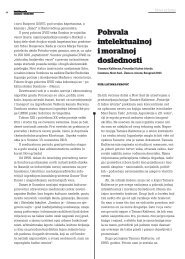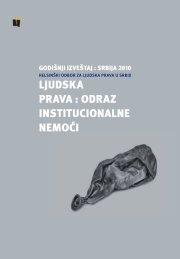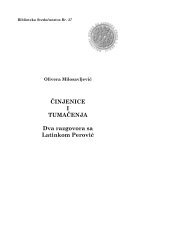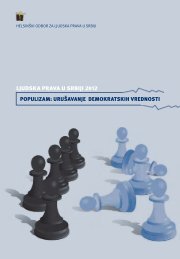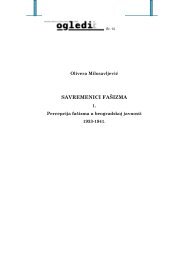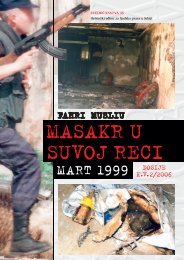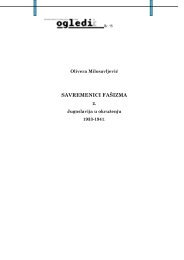Human Rights: Hostage To the State's Regression - Helsinki ...
Human Rights: Hostage To the State's Regression - Helsinki ...
Human Rights: Hostage To the State's Regression - Helsinki ...
Create successful ePaper yourself
Turn your PDF publications into a flip-book with our unique Google optimized e-Paper software.
<strong>Helsinki</strong> Committee for <strong>Human</strong> <strong>Rights</strong> in Serbia<br />
early 1990s – was not homogeneous in terms of ideology and political practice.<br />
And yet, its representatives can be seen as advocates of <strong>the</strong> same ideological<br />
current when one takes into account <strong>the</strong> character of <strong>the</strong> alternative power that<br />
emerged with <strong>the</strong> Serbian Radical Party. The party and its immense social<br />
impact in <strong>the</strong> first place testify that political options in Serbia are defined by a<br />
specific criterion: by acceptance or nonacceptance of <strong>the</strong> model of European<br />
civilization in <strong>the</strong> most general sense, <strong>the</strong> character of a state included, ra<strong>the</strong>r<br />
than by <strong>the</strong> choice between conservativism, liberalism and radicalism as<br />
Europe denotes those terms. Serbian au<strong>the</strong>ntic radicalism had built its program<br />
of “people’s state” on patriarchal-collectivistic and egalitarian understanding<br />
of freedom and democracy. And as such it was a negation of a modern state<br />
and its elements. 9<br />
Serbia – a failed transitional country facing numerous demands – is<br />
nei<strong>the</strong>r capable nor wants to adjust itself to <strong>the</strong> standards and criteria of new<br />
international circumstances. For, globalization threatens <strong>the</strong> existing structures<br />
and social relations, while Serbia’s new political class would not risk <strong>the</strong><br />
prestige it seized under Milosevic’s rule. This gives rise to intolerance to any<br />
o<strong>the</strong>rness, <strong>the</strong> concept of EU’s multiculturalism in particular. And, at <strong>the</strong> same<br />
time, this fosters radicalism in Serbia.<br />
The parliamentary elections of January 21, 2007 did not change much<br />
<strong>the</strong> positions of Serbia’s three biggest parties – <strong>the</strong> Democratic Party /DS/, <strong>the</strong><br />
Democratic Party of Serbia /DSS/ and <strong>the</strong> Serbian Radical Party /SRS/. SRS<br />
won <strong>the</strong> majority of vote 10 (28.7%), DS gained 23%, while DSS only in coalition<br />
with two extremely populist parties (one founded by Arkan and <strong>the</strong> o<strong>the</strong>r led<br />
by Velja Ilic) managed to get 16 % of vote. Unlike after previous elections <strong>the</strong><br />
parties of ethnic minorities entered <strong>the</strong> parliament this time. However, it was<br />
<strong>the</strong> Liberal Democratic Party-Civic Alliance of Serbia-Social Democratic Union-<br />
League of Vojvodina’s Social Democrats headed by Cedomir Jovanovic that<br />
made a real breakthrough in <strong>the</strong> Serbian political scene. This was <strong>the</strong> first<br />
coalition that opened <strong>the</strong> door to <strong>the</strong> liberal and pro-European Serbia on its<br />
own. With its 15 MPs <strong>the</strong> coalition will be a major moral corrective for <strong>the</strong><br />
Democratic Party in <strong>the</strong> first place, i.e. for <strong>the</strong> part of its membership close to<br />
<strong>the</strong> coalition’s political stands.<br />
9 Olga Popovic, “The Origins of Anti-Modern Political Culture in Serbia,”<br />
<strong>Helsinki</strong> Charter No. 103-104, January-February, 2007.<br />
10 Electoral results mirror Serbia’s realities. Mostly morally indifferent to <strong>the</strong><br />
issue of responsibility for wars and war crimes, Serbia’s electorate still supports <strong>the</strong><br />
promoters of warring policy, and ultranationalistic and populist individuals and parties.<br />
The electorate is actually seduced by <strong>the</strong>ir nationalistic rhetoric, soap-opera archaism<br />
and mythomania, and, generally, by <strong>the</strong>ir anti-capitalist and anti-Western demagogy.<br />
Depending on petty political needs, <strong>the</strong>ir focuses oscillate from social issues to <strong>the</strong><br />
Greater Serbia project for pan-Serbian unification.<br />
<strong>Human</strong> <strong>Rights</strong>: <strong>Hostage</strong> <strong>To</strong> <strong>the</strong> <strong>State's</strong> <strong>Regression</strong><br />
The absence of political will for fundamental change coincides with<br />
<strong>the</strong> absence of political and social energy. The real progress Serbia can make in<br />
<strong>the</strong> direction of <strong>the</strong> EU remains an open question when one takes into account<br />
her frustrating experience. <strong>To</strong> overcome her post-imperial trauma Serbia needs<br />
a more responsible and efficient political elite capable of solving her crucial<br />
dilemma of today: to break with <strong>the</strong> past and move forward, or to resume her<br />
patriarchal model. Regardless of <strong>the</strong>ir opposite stands, only <strong>the</strong> Radicals and<br />
<strong>the</strong> Liberal Democratic Party manifest sufficiently convincing political energy<br />
this dilemma necessitates.<br />
Serbia’s overall problems are additionally weighted by <strong>the</strong> state’s<br />
domination over <strong>the</strong> society and non-existent political system. The advocacy of<br />
“one party, one civil society” concept actually aspires to block<br />
institutionalization by preventing new factors from stepping on social and<br />
political scenes. Apart from <strong>the</strong> <strong>the</strong>sis about <strong>the</strong> world’s conspiracy against<br />
Serbia - i.e. <strong>the</strong> world is to blame for all evil that has befallen Serbia - <strong>the</strong> notion<br />
of “inner enemy” is reintroduced. In <strong>the</strong> wake of <strong>the</strong> parliamentary debate on<br />
Kosovo of February 14, 2007, a guest of <strong>the</strong> TV B92’s show “Kaziprst”<br />
/Forefinger/ called Cedomir Jovanovic <strong>the</strong> enemy of <strong>the</strong> people because he had<br />
not voted for <strong>the</strong> Resolution on Kosovo.<br />
Though in late 2006 Serbia was admitted to <strong>the</strong> Partnership for Peace<br />
and <strong>the</strong> major regional organization CEFTA, her overall relations with<br />
neighbors and <strong>the</strong> world were negative. This was <strong>the</strong> more so evident since in<br />
2006 <strong>the</strong> international community - via its relevant organizations and figures<br />
directly involved – continued to endeavor to keep Serbia on <strong>the</strong> course of<br />
Euro-Atlantic integrations. However, <strong>the</strong> official Belgrade’s response was<br />
inadequate. On <strong>the</strong> one hand that can be ascribed to undefined democratic<br />
processes weighted by Serbia’s patriarchal-authoritarian tradition – an<br />
objective limitation that is hard to overcome. But, on <strong>the</strong> o<strong>the</strong>r, during <strong>the</strong> last<br />
year of his term Premier Vojislav Kostunica manifested such disregard to<br />
Euro-Atlantic integrations that finally disclosed his anti-European orientation.<br />
And <strong>the</strong> entire cabinet’s policy was shaped by his tendency.<br />
Therefore, <strong>the</strong> cooperation with The Hague Tribunal suffered a fiasco<br />
as well. Not only Serbian authorities failed to arrest Ratko Mladic but, as it<br />
turned out, did not intend to arrest him at all. Besides, Serbia was<br />
uncooperative when it came to supplying The Hague Tribunal with relevant<br />
documentation. One of <strong>the</strong> reasons was that in 2006 <strong>the</strong> process instituted by<br />
Bosnia-Herzegovina’s charge for aggression and genocide entered upon <strong>the</strong><br />
final stage. Even <strong>the</strong> part of <strong>the</strong> documentation forwarded earlier to The Hague<br />
Tribunal remained out of <strong>the</strong> reach of <strong>the</strong> International Court of Justice thanks<br />
to an agreement with Main Prosecutor Carla del Ponte. 11 The fact that<br />
11 Phon van den Biesen,”When it comes to Serbia’s responsibility for <strong>the</strong><br />
Srebrenica massacre <strong>the</strong> Court was in no position to conclude that Serbia had<br />
22<br />
23



